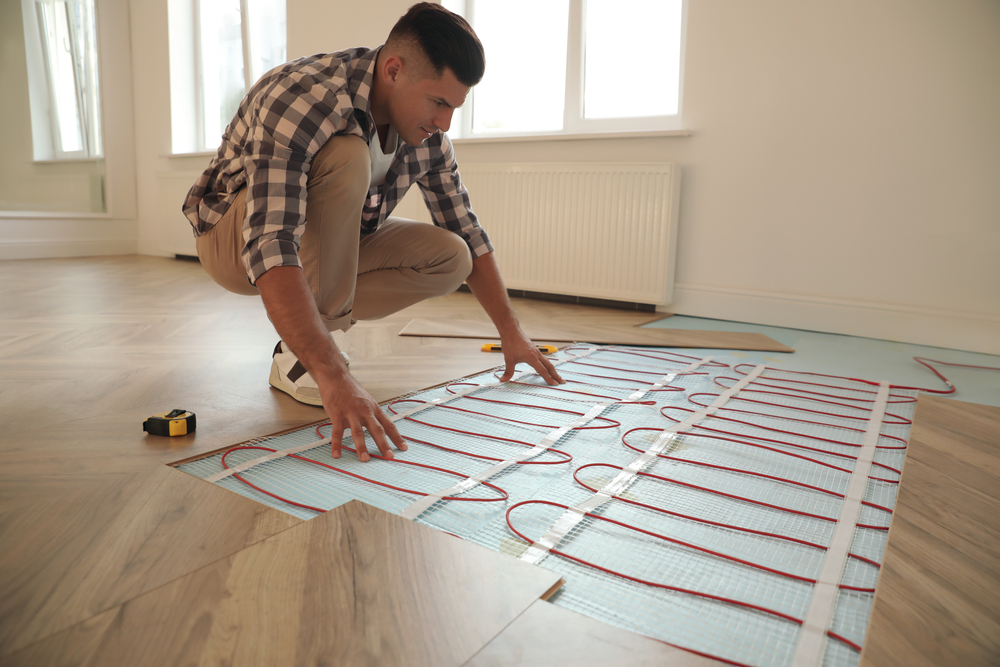Which Flooring Can I Use With Underfloor Heating?
Underfloor heating is often seen as a luxury due to its initial high cost. However, it can be a worthwhile investment for those who value the benefits it provides, for instance, providing warmth underfoot, evenly distributing heat around the room, energy-efficiency and the fact you can remove any bulky radiators that take away from the aesthetic.
However, there are types of flooring that are not suitable for underfloor heating. The last thing you want is laying unsuitable flooring which risks being damaged by the underfloor heating, subsequently wasting your money. If you are planning on installing an underfloor heating system in your home anytime soon, make sure to choose the following suitable floorings for the best results.
Engineered Wooden Flooring
As a golden rule, we do not recommend laying solid wood flooring with an underfloor heating system because it is not manufactured or treated to be, unless said otherwise. If you do decide to do this, it can cause the solid wooden boards to cup or bow. This is particularly true for any new wood, especially if the boards are 180mm wide.
As a better alternative, engineered wooden flooring is slightly different as these boards are multi-layered and finished with a final layer of solid wood. This means you still have all the natural characteristics of a solid wooden floor while still enjoying the benefits of underfloor heating. Engineered wooden boards are much more stable in form and less likely to change from varying temperatures than solid wooden boards. In short, if you are looking to pair a wooden floor with underfloor heating, we advise you to go with engineered wooden flooring.
Laminate Flooring
Another flooring suitable for underfloor heating is laminate flooring. This is due to its hard-wearing abilities and ability to expand and contract during temperature changes. If your underlay has a hot water system, it needs to be prepared before fitting laminate flooring. In terms of underfloor heating systems, we recommend making sure the type and the thickness of laminate flooring you chose is suitable for underfloor heating by contacting the manufacturer directly, this is because some floorings may not be tested and approved yet. It is also worth noting, the maximum temperature your laminate flooring should be heated to is 27°C. Any higher temperature can cause warping or lifting.
LVT (Luxury Vinyl Tiles)
If you like the appearance of LVT, you will be glad to learn that LVT tiles can be paired with underfloor heating systems. LVT comes in various thicknesses, so standard or slightly thinner tiles allow the heat to come through from the underfloor heating better, leading to less energy being used. Afterall, LVT generally has a tepid underfoot as it is, compared to cold wooden flooring. This means you will need energy to heat rooms with LVT.
Carpets
Most people assume that underfloor heating is only suitable for hard flooring, but you might be surprised to learn that carpet flooring is also suitable for underfloor heating. Carpets tend to hold on to heat, which means you can enjoy a warm and soft underfoot for longer. Saying that, it’s important to consider if your chosen carpet and the underlay meets the requirements for underfloor heating such as the material and tog value of the carpet. For example, if you have a wool carpet with a high tog rating or with a thick underlay, you may not fully feel the benefits of your underfloor heating.
Visit Value Carpets & Flooring
On a final note, it’s important to consider the room which needs flooring. For instance, carpets and engineered wood floors are popular in living rooms and bedrooms, whereas laminate flooring and LVT are more commonly seen in kitchens and conservatories. Have you decided on which flooring you would like on top of your underfloor heating? Then pay a visit to Value Carpets & Flooring in Cannock or Birmingham to see our range of engineered wooden flooring, laminate flooring, LVT and carpets. We also offer a fitting service for easy and quick installation. Our team will be on hand to help you pick a suitable flooring for your home and answer any questions you may have. For more information, please contact us.

